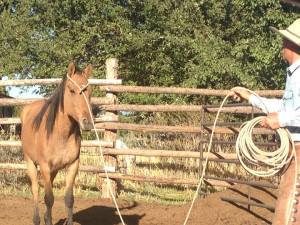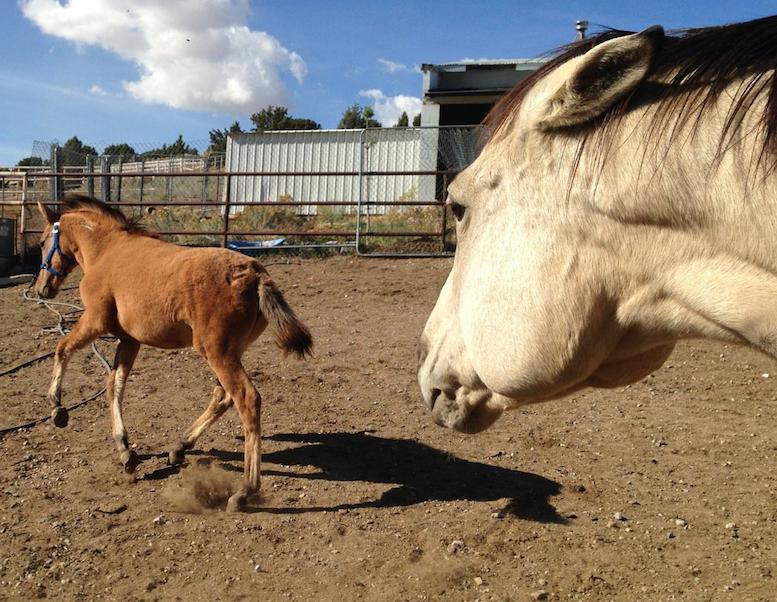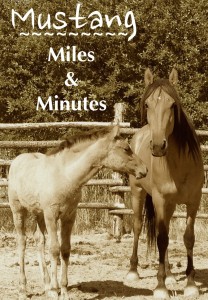 This month, Raechel Nelson worked with Steve Peters to get further down the path with Alita. Dr. Peters, co-author of Evidence-Based Horsemanship and one who’s worked with a variety of challenging horses, knows how to rope and used that skill to make progress.
This month, Raechel Nelson worked with Steve Peters to get further down the path with Alita. Dr. Peters, co-author of Evidence-Based Horsemanship and one who’s worked with a variety of challenging horses, knows how to rope and used that skill to make progress.
Meanwhile, Raechel also advanced with five-month old Zita, moving her out of the round pen for hours of social interaction with her other horses.
What is Mustang Miles & Minutes?
Miles & Minutes is generously sponsored by Redmond Equine.
We talked with Steve and Raechel after several sessions in the round pen.
BHP: Why did you bring Steve in to work with Alita?
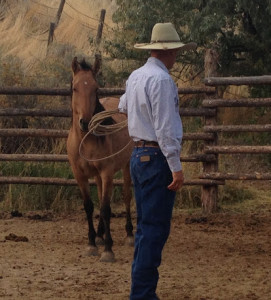 RN: I realized I had a little fear about the aggressiveness that she has shown so far. It’s been really, really good to watch it play out with Steve. I think I would have shut down when she showed signs of aggression and just stopped. Watching Steve acknowledge it and keep moving through it, I don’t think that was something I could do. Not knowing what to do with the fear and aggression would have stopped me in my tracks.
RN: I realized I had a little fear about the aggressiveness that she has shown so far. It’s been really, really good to watch it play out with Steve. I think I would have shut down when she showed signs of aggression and just stopped. Watching Steve acknowledge it and keep moving through it, I don’t think that was something I could do. Not knowing what to do with the fear and aggression would have stopped me in my tracks.
BHP: Would that have been a real roadblock or something that you would have worked through eventually?
RH: It’s something that I wouldn’t have dealt with until spring. Mentally, I would have been over the hurdle of ‘she’s protecting her baby.’ But I still think I would have gotten stonewalled with the aggression.
BHP: Tell us a bit about your progress with Zita.
RN: First, she was turned out by herself in another pen. Then, I turned her out with Maggie (an older mare). They got along pretty well as long as the filly wasn’t in Maggie’s space. The next day, I turned her out with Skeet, the gelding, too. Now, she goes and hangs out with the two of them when we’re working with Ali. It’s worked really well.
BHP: Steve worked on the ground and in the saddle?
RN: Yes, Steve was a little concerned about the aggression. When he got in the round pen today, she was confrontational from 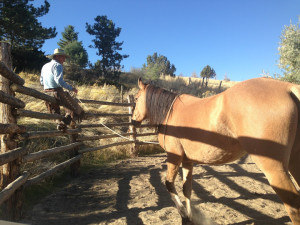 the get-go. As Steve said: ‘Your rope doesn’t scare me anymore. Your flag doesn’t scare me anymore. You don’t scare me anymore.’
the get-go. As Steve said: ‘Your rope doesn’t scare me anymore. Your flag doesn’t scare me anymore. You don’t scare me anymore.’
He felt he’d be more confident on horseback.
Poor Skeet. Bless his heart. He tried. But Skeet’s experience with herding other animals is just chasing them. He does that well. Steve was swinging a rope off him and he was doing just fine, but when Ali ran, Skeet thought his job was to chase, not to stop and pull… It was just a bit more excitement than Skeet could handle. So, Steve went back to roping from the ground.
BHP: What was Ali’s reaction to being roped?
RN: The first time she felt a rope, she blew. It was more than she could handle.
Today, she had the rope around her a lot. She looked like a little Christmas package.
Her progress in moving to pressure has been really observable. Yesterday, he was putting all his weight into moving her and getting her to give. Today, he sat on the fence and drew her in more lightly. That was cool to see the progress.
She’s getting better with contact. Before, if the rope touched her nose, she’d be off. Today, she was using it to rub against, to scratch an itch. A lot of this stuff will lead to getting a halter on her.
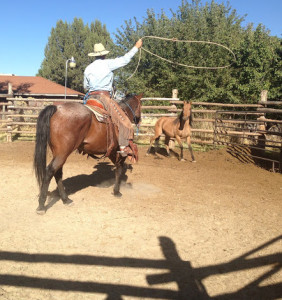 I’ve tried to find videos that show a clinician working an animal as untouched as she is. I can’t find one. She’s different. Those horses in the videos come around really quickly. You can tell that she’s just different. She’s intelligent. She’s agile. When Steve was trying to rope her, she was figuring out where it was coming before it left his hands. She was going the other direction before the rope hit the ground.
I’ve tried to find videos that show a clinician working an animal as untouched as she is. I can’t find one. She’s different. Those horses in the videos come around really quickly. You can tell that she’s just different. She’s intelligent. She’s agile. When Steve was trying to rope her, she was figuring out where it was coming before it left his hands. She was going the other direction before the rope hit the ground.
BHP: Do you get the feeling that once she realizes it’s not worth being aggressive and that she’ll be rewarded for joining up with you, she’ll be an even better horse than those others?
RN: I think so. It’s a big hurdle. But I think for her, it will be a relief, too. I told Steve, we can never do anything to lose her trust, to hurt her. If you treat her well, I think she’ll figure out that we’re on the same team and then she’ll be a loyal partner. But it’s going to take a while to get there.
BHP: Longer than you expected?
BHP: Steve, what are some of your observations from your work this week:
SP: I found Alita could quickly get to the point of fight or flight. She teeters on the edge of panic or aggression. She puts her ears back and gives a mean look. It seems she’s thinking, ‘Can I get a strike in without getting hurt?’ She can strike out like a boxer. When you see her moving into that fight mode, you just have to send her away.
But she has made progress with the rope. I moved the rope to her middle, back to the flank and was able to lead her like that. Once, the rope was just barely resting 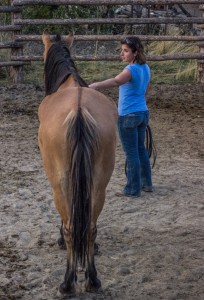 on her ears, like a crown. I found I could lead her lightly like that, because she hadn’t realized she really hadn’t been caught.
on her ears, like a crown. I found I could lead her lightly like that, because she hadn’t realized she really hadn’t been caught.
Raechel took over these last few days. Every time Ali acted aggressively, Raechel sent her away. When she wanted to stop, Raechel kept her moving and had her stop when Raechel wanted her to stop.
A lot of good stuff went on. As for actually putting hands on her, Raechel said, ‘I’m not going to worry about that.’ She’s doing a nice job. I think we got through some rough spots and now she can just take over.

